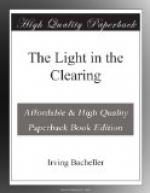It touched my heart and I lay listening for a time but heard only the loud whisper of the popple leaves.
CHAPTER VI
THE GREAT STRANGER
Some strangers came along the road those days—hunters, peddlers and the like—and their coming filled me with a joy which mostly went away with them, I regret to say. None of these, however, appealed to my imagination as did old Kate. But there was one stranger greater than she—greater, indeed, than any other who came into Rattleroad. He came rarely and would not be long detained. How curiously we looked at him, knowing his fame and power! This great stranger was Money.
I shall never forget the day that my uncle showed me a dollar bill and a little shiny, gold coin and three pieces of silver, nor can I forget how carefully he watched them while they lay in my hands and presently put them back into his wallet. That was long before the time of which I am writing. I remember hearing him say, one day of that year, when I asked him to take us to the Caravan of Wild Beasts which was coming to the village:
“I’m sorry, but it’s been a hundred Sundays since I had a dollar in my wallet for more than ten minutes.”
I have his old account book for the years of 1837 and 1838. Here are some of the entries:
“Balanced accounts
with J. Dorothy and gave him my note for $2.15,
to be paid in salts
January 1, 1838. Sold ten bushels of wheat to
E. Miner at 90 cents,
to be paid in goods.
“Sold two sheep
to Flavius Curtis and took his note for $6, payable
in boots on or before
March the first.”
Only one entry in more than a hundred mentions money, and this was the sum of eleven cents received in balance from a neighbor.
So it will be seen that a spirit of mutual accommodation served to help us over the rough going. Mr. Grimshaw, however, demanded his pay in cash and that I find was, mainly, the habit of the money-lenders.
We were poor but our poverty was not like that of these days in which I am writing. It was proud and cleanly and well-fed. We had in us the best blood of the Puritans. Our fathers had seen heroic service in the wars and we knew it.
There were no farmer-folk who thought more of the virtue of cleanliness. On this subject my aunt was a deep and tireless thinker. She kept a watchful eye upon us. In her view men-folks were like floors, furniture and dishes. They were in the nature of a responsibility—a tax upon women as it were. Every day she reminded me of the duty of keeping my body clean. Its members had often suffered the tyranny of the soaped hand at the side of the rain barrel. I suppose that all the waters of this world have gone up in the sky and come down again since those far days, but even now the thought of my aunt brings back the odor of soft soap and rain barrels.




